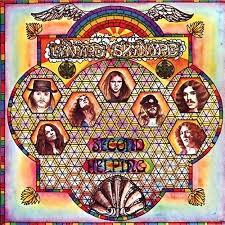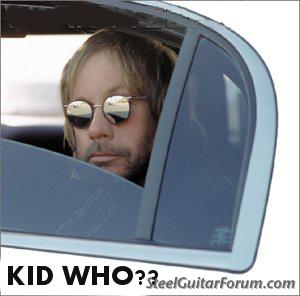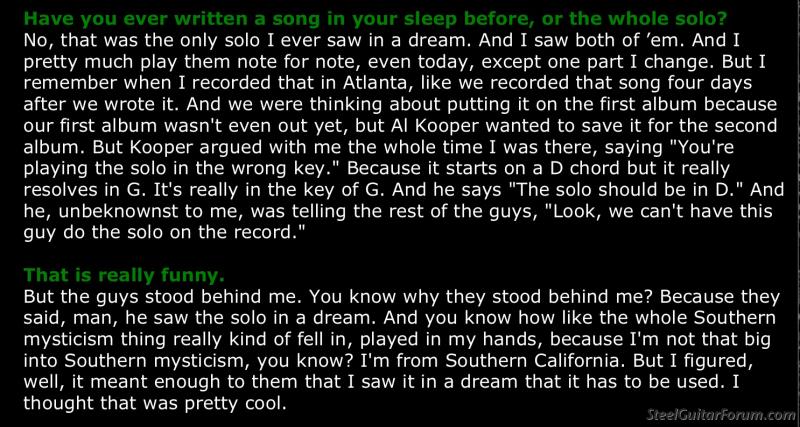Page 5 of 6
Re: I feel like such a troll.
Posted: 26 Dec 2015 4:24 am
by Charlie McDonald
b0b wrote:If mixolydian was acknowledged as a key, we couldn't have endless arguments about Sweet Home Alabama.
I thought it was funny. I think of you as more of an elf.
(If you can feel like the world biggest troll, you're not trolling hard enough.)
From Reddit:
Lynyrd Skynyrd compounded the issue with a trololol ending on a extended G for live performance.
Maybe it's Skynard that were trolling for a resolution.
Language is being deconstructed. Whether the correct verb case should be 'was' or 'were' doesn't change the meaning of the sentence.
We're deconstructing the musical language. Prolly [sic] we shouldn't worry until music itself gets deconstructed.
I personally liked 'Gloria' not because some guitarist had some linguistic knowledge (he didn't) but because you could dance to it.
What we call something is different from the thing itself. The discussion--also not the thing itself--will, like Sweet Home Alabama, go on.
So I gather in:
Neither. It's 1 b7add9 4.
you were joking. And here I thought I should take it seriusly.... I mean, shouldn't 4 be 11?

Re: I feel like such a troll.
Posted: 26 Dec 2015 9:09 am
by b0b
Charlie McDonald wrote:
So I gather in:
Neither. It's 1 b7add9 4.
you were joking. And here I thought I should take it seriusly.... I mean, shouldn't 4 be 11?

As Jimi said, "If 6 turned out to be 9, I don't mind."
Posted: 26 Dec 2015 9:14 am
by Jerry Hayes
I can't believe this thread is still going... Just check out the sheet music to this song and look at the chord signature which is "one sharp".... To me that's always been the key of G....JH in Va.
Posted: 26 Dec 2015 9:23 am
by b0b
Jerry Hayes wrote:Just check out the sheet music to this song and look at the chord signature which is "one sharp".... To me that's always been the key of G....JH in Va.
How do you know it's not the key of E minor which is also "one sharp"? My point is that D mixolydian is the same scale - one sharp - but it's a different key. The number of sharps only tells you what key if you know the mode.
Posted: 31 Dec 2015 9:22 am
by Godfrey Arthur
From a cowboy perspective it's D, but then it goes home to G. Solo sounds natural in G. One of those songs that starts off on the 5.


Posted: 31 Dec 2015 10:06 am
by Joachim Kettner
There's another "pretty one" by Kid Rock. How I hate these chord changes.
https://www.youtube.com/watch?v=a88NjrrVFVs
Posted: 31 Dec 2015 10:47 am
by Godfrey Arthur
This is where they started blurring rock with rap.
Sounds like they rammed Skynyrd and Zevon in a grinder and hashed this out.

Posted: 31 Dec 2015 11:38 am
by Jerry Overstreet
I'm no expert theorist, but if these charts are correct, the notes are the same for G major and D mixolydian. If
I were writing a chord chart for it, it would be in the key of G, one #. It would be interesting to see the views of Paul and Tommy, et al Nashville studio guys but I doubt they would want to get into this mess.

I'm convinced there will never be a definitive answer that everyone can agree on. JMO.


Posted: 31 Dec 2015 11:43 am
by Mark van Allen
Not to be a jerk… and not aimed at you, Jerry, as you're correct on the modal connection.
Imagine someone drops by here hoping to "know" the answer to the original question when they leave.
You don't "know" what a mixolydian mode of a scale is.
You don't "know" that any given key signature can represent a few different modes which are basically in different keys. As several of us have pointed out.
But you "know" that some sheet music with one sharp means it's the key of G. So it is.
Or you "know" that it's a crappy song, to you, so it just doesn't matter.
Again, I feel sympathy sometimes for people who look around for factual help with a question. And leave "knowing" that there are bunch of people here with opposing "knowns".
Posted: 31 Dec 2015 12:15 pm
by Jerry Overstreet
All due respect to those of you that are way more musically educated than I, but I have never in my entire life had anyone either orally or in a chart call out a key to me as mixolydian, phyrigian, dorian or any other mode. But I don't come in contact with complicated rock and blues much and I admit, most of the musicians I associate with are not a lot more formally musically aware than me.
I know to some, this discussion seems pointless, trivial and a waste of time and space, but I have delved deeper into theory as a result of this discussion and I hope to have learned something either directly or indirectly through my research that goes way further than a simple either/or conclusion. So, I'm grateful for the thoughts proffered here by those way more familiar than me and I defer to the more knowledgeable.
In this case however, I don't see how, theoretically, there could ever be a definitive conclusion since there are so many ways to interpret it.
A bit aside, but anytime someone throws a minor key at me, I immediately start thinking of it's relative major and most times, my solos are out of that. F.I., Em it's G.
Posted: 31 Dec 2015 1:29 pm
by Charlie McDonald
It's the end of the year (and even that is an artificial designation).
Times were simpler before there was time (cavemen didn't play in keys, they didn't even have Doors).
From page 3:
Mark van Allen wrote:It appears that several of us are in agreement on D Mixolydian. But I bet it'll be back in "G" any minute now…
It was a prognostication. Things are indeed drifting that way.
Tomorrow, it'll all be forgotten, until it starts all over again.
I love the silly season between Christmas and New Year, cut loose from our temporal moorings, left to drift asea in modern life....
It's a fun place.
Makes me feel like globbing. But I won't.
Must be a resolution.
Or a summation.
Posted: 31 Dec 2015 2:09 pm
by Godfrey Arthur
From the horse's mouth, Ed King who did the solo on the album cut, playing the solo as special treat for us LPF guys, says the song is in G:
https://www.youtube.com/watch?v=XUVpZQesp5w
Posted jpeg off his Photobucket account by Ed himself on the Les Paul Forum 02-25-15. An excerpt from an article he did years ago.

Ed also added:
"Many believe the song is in D. The vocal IS SUNG in D but I've always heard it resolving in G. It's a 5-4-1 progression. The ONLY way I can hear it in D is if you split the last bar off the riff...2 beats on G, go back to D for 2 beats. But it stays on G for that bar. One sharp in the time sig. Wolf MARSHALL says so. "
Here's more Ed King candy:
https://www.youtube.com/watch?v=kTHW06DfwvY
https://www.youtube.com/watch?time_cont ... CW3RzpwTYU
******
Trivia of no small account Ed co-wrote for this group:
https://www.youtube.com/watch?v=9scsSgNNnBE
****
And I might add that back then when this song, Sweet Home, hit the airwaves, Ed's solo was magic played the way it was up against those two oscillating keys.
Godfrey
Posted: 31 Dec 2015 2:31 pm
by Mark van Allen
Well, there you go. Unless the horse's mouth could be the producer or other members of the band including the songwriter…
At least we're not alone: 51 pages on this.
http://www.thegearpage.net/board/index. ... f.1087493/
Take note of the second page where a poster has found sheet music in both one and two sharps…
This may be one of those climb-to-the-mountaintop-and-ask-the-guru questions.

Posted: 31 Dec 2015 2:43 pm
by Godfrey Arthur
Mark van Allen wrote:Well, there you go. Unless the horse's mouth could be the producer or other members of the band including the songwriter…
Mark,
Ed King is listed as the principal songwriter on Sweet Home Alabama with Gary Rossington and Ronnie Van Zant listed in that order as writers.

Posted: 31 Dec 2015 3:35 pm
by Doug Beaumier
All that quote proves is that Ed King thought the song was in the key of G so he played the solo in G. Al Kooper (producer) said Ed was playing the solo in the wrong key. To my ears the solo sounds wrong and unsure. Sounds like a player who's nervously trying to make his solo fit the chord structure, hitting bad notes and bending them up to correct things. I was never a fan of LSB anyway.
Posted: 31 Dec 2015 3:43 pm
by Charlie McDonald

If the writers can't decide, no wonder neither can we.
I'm not a fan either, but they paid me $250 to tune their piano in OK City. So I love 'em.
Posted: 31 Dec 2015 3:49 pm
by Mark van Allen
One could make an assertion that with something like "key" there is an absolute, a correct answer. So the ambiguities here become interesting, and interestingly debatable. I would think history had already proven that because one is a famous writer, player, inventor, dictator or revolutionary, he still doesn't have a lock on "correctness". Opinion only sometimes equals fact.
I guess that's what makes it a "forum".
Posted: 31 Dec 2015 3:52 pm
by Dave Mudgett
This is an argument about notation. The concept of a "key signature" is mainly about notation. The concept of a "home" is not necessarily the same.
I think of the "home" in SHA as D, and the notes of D Mixolydian fit over the melody, much like many Celtic or bluegrass tunes "feel" like they're modal like this. Yes, the notes of DMix are the same notes as G Ionian, but coming at it from the DMix point of view makes it sound and feel different. To me, the main riff sounds and feels (very obviously) more like DMix. There are little hooks in some places that sound
very modal to me. Ed's solo definitely sounds and feels more like he's coming more from G Ionian, and that's the way he obviously was thinking about it.
To me, insisting that the only way to look at Sweet Home Alabama is G Ionian is analogous to insisting that the only way to look at Bach's Toccata and Fugue in D Minor (Aeolian) is in the key of F Major (Ionian). It feels that obvious (and wrong) to me.
https://www.youtube.com/watch?v=bkUUjUJ4wHg
Another point: for the most part, the mainstream tradition of classical Western music thinks about keys in terms of Major (Ionian) or Minor (Aeolian). Other traditions (like African, Middle Eastern, and others) focus on other tonalities. Blues and rock-and-roll owe a LOT to these other traditions which really aren't even exactly the same as any of the normal Western 'modes'. To me, the 'real' blues aren't even exact subsets of Dorian or Mixolydian. You get close to a minor blues pentatonic from Dorian and major pentatonic from Mixolydian, but blues and (IMO, good) rock and roll schmears that stuff at will. Western classical tradition doesn't really recognize "blue" notes. So what? That doesn't deny their existence - or
legitimacy.
There's no "winning" this argument. Everybody will look at it in their own way, and there's not a damned thing anybody here (or anywhere else) can or should do about it.
Posted: 31 Dec 2015 4:13 pm
by Doug Beaumier
As others have pointed out... D Mix. and G major scale have the exact same notes. G major scale starts on G, and D Mix. starts on D (same notes). So it's a matter of the approach the player uses, the feel, the bends, and the note(s) he resolves the licks to. The more I think about this... the more I realize that the nomenclature is not all that important and we could call it either key of G or D mixolydian. All I know is, I never liked the song, and some parts of the solo sound wrong to me.
I think a rhythm player (chord player) would be more inclined to think of the song in the key of G, and a lead player might think more in terms of the mixolydian mode (Dmix).
Posted: 31 Dec 2015 4:24 pm
by Godfrey Arthur
Doug Beaumier wrote:All that quote proves is that Ed King thought the song was in the key of G so he played the solo in G. Al Kooper (producer) said Ed was playing the solo in the wrong key. To my ears the solo sounds wrong and unsure. Sounds like a player who's nervously trying to make it up as he goes along, hitting bad notes and bending them up to correct things. .
Good point Doug.
Yet the guy wrote the song and then he throws in Wolf Marshall as an educated reference.
Al was the producer but not the song writer and as a producer he heard things go in a different direction. As Ed explains it was 5-4-1 not 1-4-5. And had Ed not played the solo we can only imagine how this song would've turned out. Juxtapose this to the Fab Four's first stabs at recording, not being musically educated, producer George Martin who was, did do much to shape the sound of the Beatles early on.
Al is a good producer and an historical figure in production as well as Hammond organ playing notably Dylan's
Like A Rolling Stone as well as founding bands like Blood Sweat And Tears. Background on the Dylan song, Al wanting to be part of the historic song grabbed the organ because someone else was supposed to play guitar, and the song's producer wanted to bury the organ parts Al played when Dylan himself suggested (according to the lore) they leave the organ tracks and to build around them.
The rest as they say... Sometimes the producer isn't 100% right.
If mathematics, which music is a part of holds muster, and co-existing dimensions overlapping is a given, it is then natural for two (or more) dimensions to occupy the same space, as it were. We may try and wrap our heads around things that seem out of this world, sometimes. And with music it appears that
out of this world breaks new ground.
Guess then we wait until someone with more science background can prove that the event horizon for this black hole is in the key of....

But you know, steel players who have an even more difficult music dimension(s) to deal with should be a good bounce point for what key the song is really in. This is as it should be.
Posted: 31 Dec 2015 4:35 pm
by Charlie McDonald
I have to say, despite the song, this is one of the most interesting and intellectual discussions carried out on the forum.
Lynyrd Skynyrd meets Bach, George Martin and Dylan--it doesn't get any better.
It shows the remarkable depth of talent on the Forum.
Posted: 31 Dec 2015 4:45 pm
by Godfrey Arthur
Doug Beaumier wrote:some parts of the solo sound wrong to me.
You hit on the magic ingredient. I have over the years explained that popular music is social engineered. What better way to grab a listener's ear than to play something that grates or is "wrong."
Ever notice sometimes a song may start in a certain key at a certain pitch then another part of that song (which may have been flown/spliced in from another piece of tape from a previous take-talking pre digitial) and the rest of the song is slightly off pitch to the way the song started?
It gets one's attention especially if the listener has good or relative pitch at least. In the end that's what is important.
This song Sweet Home is a child of the psychedelic 60's with Incense and Peppermint's Ed King mixing with rolling stone Al Kooper so if Tim Leary were not called in to circumvent the 60's generation using musicians, with LSD, then he would've failed at his job given him by the CIA.

Some of the Alarm Clock lyrics:
To divide the cockeyed world in two.
Throw your pride to one side,
It's the least you can do.
Beatniks and politics, nothing is new.
A yardstick for lunatics, one point of view.
As musicians we must not lose sight of this fact that music for the last 60 years has been controlled as to content and direction AND AN EFFECT ON OUR PSYCHES.
Check out Tim doing his "work."
https://www.youtube.com/watch?v=WISFFhU9hVc
Posted: 31 Dec 2015 5:06 pm
by b0b
Charlie McDonald wrote:
If the writers can't decide, no wonder neither can we.
I'm not a fan either, but they paid me $250 to tune their piano in OK City. So I love 'em.
Did you tune it in G or in D?

Posted: 31 Dec 2015 5:10 pm
by Charlie McDonald
Both.
Posted: 31 Dec 2015 5:10 pm
by chris ivey
hey erv! where's the dead horse pic?
i still hate the song!






 If the writers can't decide, no wonder neither can we.
If the writers can't decide, no wonder neither can we.